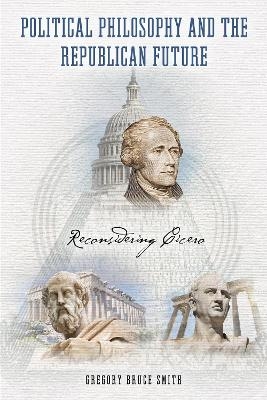
Political Philosophy and the Republican Future
Reconsidering Cicero
Seiten
2018
University of Notre Dame Press (Verlag)
978-0-268-10389-7 (ISBN)
University of Notre Dame Press (Verlag)
978-0-268-10389-7 (ISBN)
Smith attempts to reconcile the early republican tradition of Greece and Rome with more recent traditions of Locke, Machiavelli, and Rousseau in light of post nationalism and globalism.
Are we moving inevitably into an irreversible era of postnationalism and globalism? In Political Philosophy and the Republican Future, Gregory Bruce Smith asks, if participation in self-government is not central to citizens’ vision of the political good, is despotism inevitable? Smith's study evolves around reconciling the early republican tradition in Greece and Rome as set out by authors such as Aristotle and Cicero, and a more recent tradition shaped by thinkers such as Machiavelli, Locke, Montesquieu, Adam Smith, Madison, and Rousseau. Gregory Smith adds a further layer of complexity by analyzing how the republican and the larger philosophical tradition have been called into question by the critiques of Nietzsche, Heidegger, and their various followers.
For Smith, the republican future rests on the future of the tradition of political philosophy. In this book he explores the nature of political philosophy and the assumptions under which that tradition can be an ongoing tradition rather than one that is finished. He concludes that political philosophy must recover its phenomenological roots and attempt to transcend the self-legislating constructivism of modern philosophy. Forgetting our past traditions, he asserts, will only lead to despotism, the true enemy of all permutations of republicanism. Cicero's thought is presented as a classic example of the phenomenological approach to political philosophy. A return to the architectonic understanding of political philosophy exemplified by Cicero is, Smith argues, the key to the republican future.
Are we moving inevitably into an irreversible era of postnationalism and globalism? In Political Philosophy and the Republican Future, Gregory Bruce Smith asks, if participation in self-government is not central to citizens’ vision of the political good, is despotism inevitable? Smith's study evolves around reconciling the early republican tradition in Greece and Rome as set out by authors such as Aristotle and Cicero, and a more recent tradition shaped by thinkers such as Machiavelli, Locke, Montesquieu, Adam Smith, Madison, and Rousseau. Gregory Smith adds a further layer of complexity by analyzing how the republican and the larger philosophical tradition have been called into question by the critiques of Nietzsche, Heidegger, and their various followers.
For Smith, the republican future rests on the future of the tradition of political philosophy. In this book he explores the nature of political philosophy and the assumptions under which that tradition can be an ongoing tradition rather than one that is finished. He concludes that political philosophy must recover its phenomenological roots and attempt to transcend the self-legislating constructivism of modern philosophy. Forgetting our past traditions, he asserts, will only lead to despotism, the true enemy of all permutations of republicanism. Cicero's thought is presented as a classic example of the phenomenological approach to political philosophy. A return to the architectonic understanding of political philosophy exemplified by Cicero is, Smith argues, the key to the republican future.
Gregory Bruce Smith is professor of political science and philosophy at Trinity College. He is the author of a number of books, including Nietzsche, Heidegger, and the Transition to Postmodernity and Martin Heidegger: Paths Taken, Paths Opened.
Preface
1. Reflections on the Tradition of Republicanism
2. Initial Reflections on Political Philosophy
3. Who Was Cicero?
4. Cicero on the Nature of Philosophy
5. Cicero on Cosmology and Natural Philosophy
6. Cicero on Natural Theology
7. Cicero on Ethics
8. Cicero on Oratory and the Language Arts
9. Cicero on Politics
10. A Brief Reflection on Nietzsche
11. Conclusion: Political Philosophy and the Republican Future
Bibliography
Index
| Erscheinungsdatum | 20.09.2018 |
|---|---|
| Verlagsort | Notre Dame IN |
| Sprache | englisch |
| Maße | 152 x 229 mm |
| Gewicht | 805 g |
| Themenwelt | Geisteswissenschaften ► Philosophie ► Philosophie Altertum / Antike |
| Sozialwissenschaften ► Politik / Verwaltung ► Politische Theorie | |
| ISBN-10 | 0-268-10389-5 / 0268103895 |
| ISBN-13 | 978-0-268-10389-7 / 9780268103897 |
| Zustand | Neuware |
| Haben Sie eine Frage zum Produkt? |
Mehr entdecken
aus dem Bereich
aus dem Bereich
mit Sokrates, Seneca, Platon & Co. im Gespräch
Buch | Hardcover (2023)
FinanzBuch Verlag
CHF 25,20


